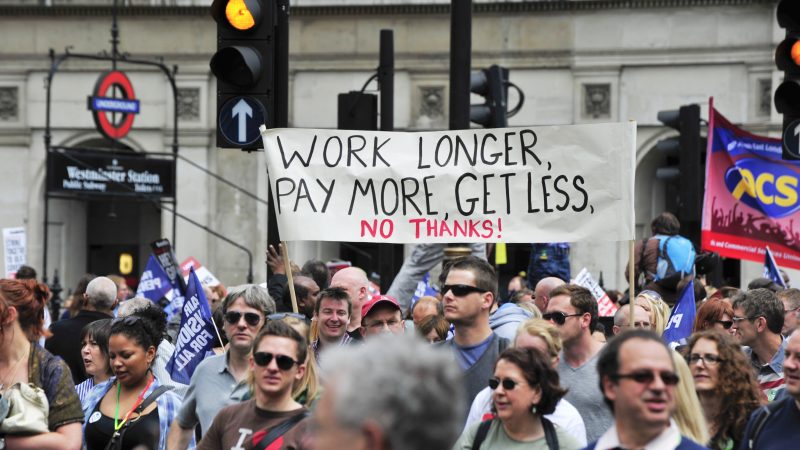
As the most significant upsurge in workers’ action for a generation continues, senior Tories are planning harsh new restrictions on our rights to organise and strike. Prospective Prime Minister Liz Truss has announced a series of proposals to restrict strikes, including increasing and extending ballot thresholds and notice periods. Soon after, Transport Secretary Grant Shapps announced his own “16-point plan”, much of it overlapping with Truss’s proposals.
Their plans build on the Tories’ existing manifesto commitment from 2019 to impose legally-mandated minimum service levels during transport strikes, which Truss and Shapps want to extend to other services. Our existing anti-strike laws are already heavily restrictive. They prohibit us from striking over issues of our choosing at a time of our choosing and impose arbitrary turnout thresholds not applied to any other area of democratic life. They seek to prohibit workers from organising as a class beyond the confines of official ‘trade disputes’ with our own employers by outlawing action in solidarity with other workers.
The Tories’ new proposals would further criminalise effective trade unionism. This is not only a matter of workers’ rights, but of basic civil liberties and democracy. The right to withdraw one’s labour is a fundamental democratic right, without which democracy effectively ends or is at least severely curtailed at the doors of the workplace. Taken alongside other legislation targeting the right to protest, such as the police bill, the Tories’ new anti-strike proposals represent a further slide towards authoritarianism.
It would be naive to imagine Truss and Shapps’ plans are just rhetorical bluster aimed at pandering to the Tory activist base at a time of rising strikes, or to expect that the slow turning of the wheels of the legislative process will de-fang the proposed laws. To confront the threat the entire labour movement, including both its political and industrial wings, must mount an urgent campaign of resistance.
That must include nuts-and-bolts campaigning in workplaces, informing trade union members about the Tories’ plans and the ways in which they’ll impact our ability to organise, along with actions including protests and rallies across the country.
Free Our Unions, the grassroots campaign against anti-strike laws backed by unions including FBU and RMT, is producing new campaigning resources to help trade union activists organise, and has written to other campaigning organisations active on this issue, including the Institute for Employment Rights and the Campaign for Trade Union Freedom, to propose joint activity.
But while campaign organisations have an important role to play, unions themselves organising activity directly is essential. Unions including RMT and Unite have policies committing them to call national demonstrations against anti-union laws, passed in response to the Tories’ 2019 commitment on minimum service levels. Now is surely the time for those policies to be enacted.
The campaign we need cannot be solely defensive, fighting only to prevent a deeply inadequate status quo from becoming worse. Our movement must loudly advocate the abolition of all legal restrictions on our rights to organise and take action, and their replacement with a full right to strike.
The vast majority of the labour movement, including the TUC, already has policies supporting the abolition of all anti-strike laws. Resolutions to that effect have also been passed by successive Labour Party conferences. Labour’s leadership must act on those policies, including by developing, sharpening, and extending the commitments in its 2021 green paper A New Deal for Workers. Labour must be part of immediate mobilisation against anti-union laws, and commit to repealing them when next in government — and replacing them with strong positive legislation enshrining the right to organise and strike.
Against the backdrop of the historically low levels of strikes we had seen until recently, advocating the repeal of all anti-union laws and the right of workers to strike in a manner of our choosing, at a time of our choosing, over issues of our choosing has sometimes seemed impossibly radical or extreme. But that is only a product of the narrowing of horizons resulting from generations of major defeats for organised labour. As our movement begins to assert itself again, it’s time for those horizons to expand.
This issue has significance well beyond the immediate sphere of day-to-day industrial relations. The prohibition on striking over ‘political’ issues, for example, means that workers are prevented from leveraging our power over production to demand radical action on climate change and transition to a zero-carbon economy. The global working class and poor are already at the sharp end of mounting environmental disaster as frontline workers such as firefighters and others dealing with extreme weather events, and as members of the communities hardest hit by climate change. Workers’ action to repurpose and convert high-emissions workplaces, as well as to demand bold action from government, is essential to prevent further ecological catastrophe. Anti-strike laws therefore not only restrict workers’ rights, but imperil the future of the planet.
Union leaders have promised “fierce resistance” if the laws are passed. We must not wait that long. That fierce resistance must be mounted now, without delay, if we are to stand any chance of preventing their imposition – or, if they are imposed, to build up the organisation and confidence to defy them when necessary.




More from LabourList
Turning the page? Labour’s recovery in the polls show a path to 2029 victory
Restoration announce recommendations for NEC candidates
‘Factionalism at the top is weakening Labour – and handing a gift to Reform’